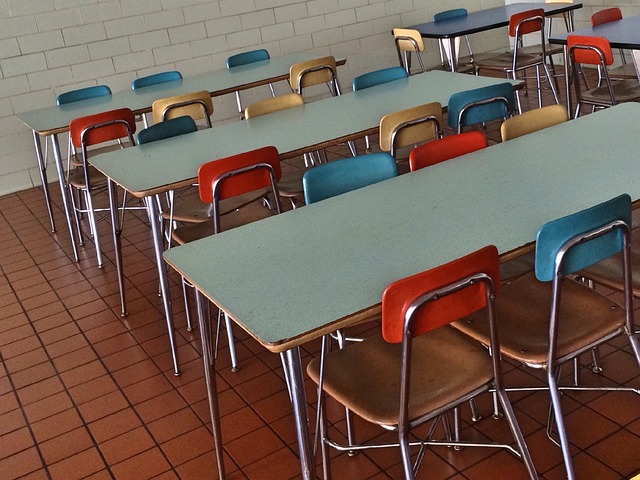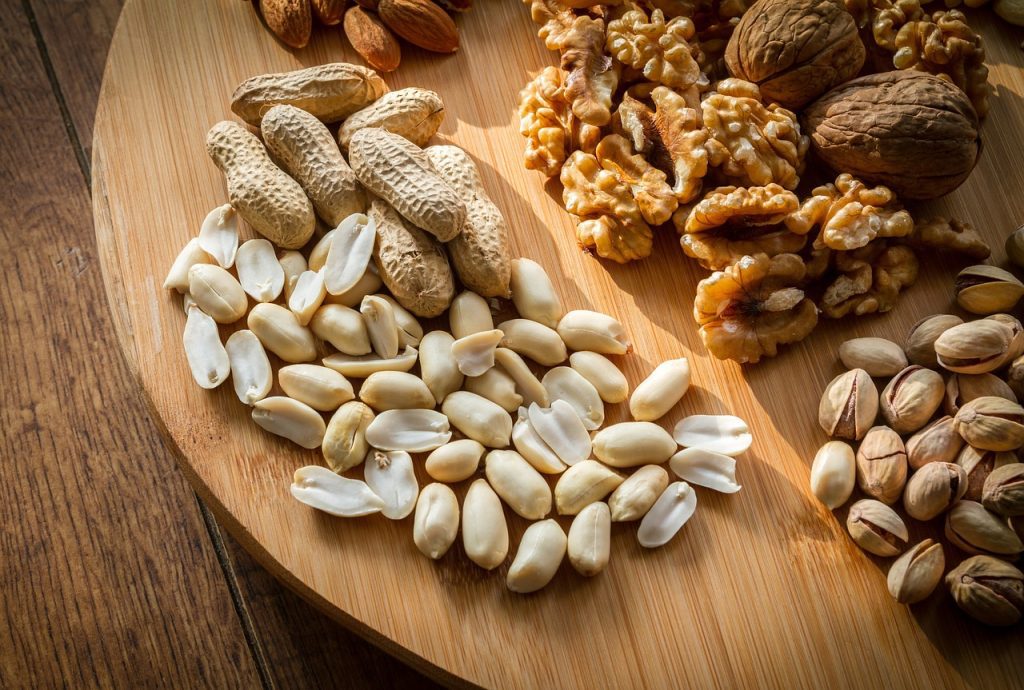Starting university can be an exciting and overwhelming time for many students. With new classes, friends, and experiences, it’s easy to forget about one of the most important aspects of college life: maintaining a healthy diet. Eating healthy is crucial for maintaining physical and mental wellbeing, which is why it’s essential for university students to make healthy eating habits a priority. However, with limited time, money, and resources, it can be challenging to know where to start, and there are studies that show that students do not eat healthily. That’s why in this blog post, we’ll share seven healthy eating tips for students. From meal planning to navigating the cafeteria, we’ll cover everything you need to know to make healthy eating a part of your university routine.
1. Plan Ahead

The Benefits of Meal Prepping
When thinking about healthy eating tips for students, meal prepping, which is the act of preparing meals in advance, has become increasingly popular in recent years. While it may seem like a daunting task to spend a few hours each week cooking, there are many benefits to meal prepping that make it a worthwhile investment.
- Saves time: Meal prepping allows you to cook multiple meals at once, which means you’ll spend less time in the kitchen during the week. By having meals ready to go, you’ll also avoid spending time deciding what to eat or waiting in line at a restaurant or cafeteria.
- Saves money: Eating out or ordering takeout can be expensive, especially for university students on a tight budget. Meal prepping allows you to buy ingredients in bulk and prepare meals at home, which can save you a significant amount of money in the long run.
- Promotes healthy eating habits: By preparing your own meals, you have control over what ingredients you use and how much you eat. This means you can choose healthier options, such as fresh fruits and vegetables, lean proteins, and whole grains. By consistently eating healthy, you’ll feel better physically and mentally.
- Reduces food waste: When you meal prep, you can portion out ingredients and only cook what you need. This means you’ll have less food waste, which is good for the environment and your wallet.
- Helps with weight management: Meal prepping can help you control portion sizes and monitor your calorie intake. This can be particularly helpful for students who may struggle with maintaining a healthy weight due to a busy schedule and irregular eating habits.
- Reduces stress: Knowing that you have meals prepared and ready to go can reduce stress and anxiety about mealtime. This can be especially helpful during midterms or finals week when stress levels tend to be high.
Overall, meal prepping is a great way to promote healthy eating habits, save time and money, and reduce stress. By making it a part of your routine, you’ll set yourself up for success both at university and beyond.
Tips for Meal Prepping on a Budget
Meal prepping can be a great way to save money and eat healthy, but it can also be expensive if you don’t plan carefully. Here are some tips for meal prepping on a budget:
- Plan your meals in advance: Before you start meal prepping, make a plan for what you’ll be eating during the week. This will help you avoid buying ingredients you don’t need and reduce food waste.
- Buy in bulk: Buying ingredients in bulk can be a great way to save money. Look for deals on items like rice, beans, and frozen vegetables. You can also consider joining a local food co-op or bulk buying club to save even more.
- Cook in batches: When you’re meal prepping, it’s more efficient to cook in large batches. This allows you to make the most of your time and energy, and also saves money on energy costs.
- Use cheaper cuts of meat: Meat can be one of the most expensive parts of a meal, but there are cheaper cuts that can be just as tasty when prepared properly. Look for sales on chicken thighs, beef chuck, or pork shoulder.
- Use canned or frozen produce: Fresh produce can be expensive, especially if you’re buying out of season. Canned or frozen fruits and vegetables are often just as nutritious and can be much cheaper. Look for no-salt-added varieties to avoid excess sodium.
- Don’t forget about leftovers: Leftovers are an important part of meal prepping on a budget. Don’t be afraid to use up ingredients you already have on hand, and plan for meals that can be repurposed into new dishes.
- Consider plant-based meals: Plant-based meals are often much cheaper than meat-based meals. Try incorporating more beans, lentils, and tofu into your meal prep routine.
By following these tips, you can meal prep on a budget without sacrificing taste or nutrition. With a little bit of planning and creativity, you can save money and eat healthy at the same time.
Suggestions for Healthy Snacks to Bring to Class
Bringing healthy snacks to class is a great way to stay fueled and focused throughout the day. Here are some suggestions for healthy snacks to bring to class:
- Fresh fruit: Fresh fruit is a great option because it’s portable, easy to eat, and packed with vitamins and fibre. Consider bringing an apple, banana, or orange to class.
- Nuts and seeds: Nuts and seeds are a great source of healthy fats, protein, and fibre. Almonds, cashews, and pumpkin seeds are all great options.
- Greek yoghurt: Greek yoghurt is high in protein and can help keep you full throughout the day. Look for a brand with no added sugar and bring along a spoon.
- Hummus and veggies: Hummus is a great source of protein and fibre, and it pairs well with veggies like carrots, cucumbers, and cherry tomatoes.
- Rice cakes with nut butter: Rice cakes are a low-calorie and gluten-free snack that can be topped with nut butter for extra protein and healthy fats.
- Energy balls: Energy balls are a portable and easy snack that can be made ahead of time. Look for recipes that are made with whole food ingredients like nuts, dates, and seeds.
- Roasted chickpeas: Roasted chickpeas are a crunchy and satisfying snack that are high in protein and fibre. Look for a brand with no added sugar or sodium.
- Dark chocolate: Dark chocolate is a great way to satisfy a sweet tooth while also getting some antioxidants. Look for a brand with at least 70% cacao.
By bringing these healthy snacks to class, you’ll have the energy and focus you need to succeed in your studies.
2. Make Healthier Choices at the Cafeteria

How to Navigate the Cafeteria to Find Healthier Options
The cafeteria can be a challenging place when looking for healthy eating tips for students, especially when there are so many tempting but less-than-healthy choices available. Here are some tips for navigating the cafeteria to find healthier options:
- Look for the salad bar: Most cafeterias have a salad bar, which can be a great source of fresh vegetables and lean protein. Look for options like spinach, kale, grilled chicken, and hard-boiled eggs.
- Choose whole foods: Try to choose whole foods like whole grains, fruits, and vegetables, rather than processed foods like chips and cookies. Whole foods are typically more nutritious and will help keep you full and focused for longer.
- Check the ingredients: If you’re unsure about an item, check the ingredients list. Avoid items with added sugars, saturated fats, and artificial flavours and colours.
- Watch your portions: It’s easy to overeat in the cafeteria, especially when you have unlimited access to food. Be mindful of your portions and try to fill your plate with mostly vegetables and lean protein.
- Ask for substitutions: If you see an item on the menu that you’d like to try, but it’s not very healthy, ask the cafeteria staff if they can make substitutions. For example, you could ask for grilled chicken instead of fried or for extra vegetables instead of a side of fries.
- Skip the soda: Instead of soda or sugary drinks, choose water or unsweetened iced tea. Sugary drinks can be a major source of empty calories and can contribute to weight gain.
By following these tips, you can navigate the cafeteria to find healthier options that will fuel your body and mind for success.
Tips for Making Better Choices When Dining Out
Dining out can be a challenge when you’re trying to make healthy choices. Restaurant meals are often high in calories, sodium, and unhealthy fats. However, with a little planning and some smart choices, you can enjoy a delicious meal while still staying on track with your health goals. Here are some tips for making better choices when dining out:
- Check the menu ahead of time: Most restaurants have their menus available online, so take a look before you go. This way, you can plan ahead and make a healthier choice rather than being swayed by the tempting options when you get there.
- Choose lean protein: Look for dishes that feature lean protein like grilled chicken, fish, or tofu. Avoid fried or breaded options, and ask for the sauce or dressing on the side.
- Go for veggies: Make sure to incorporate vegetables into your meal. Order a side salad, choose a veggie-filled stir-fry or opt for roasted vegetables as a side dish.
- Watch your portions: Restaurant portions are often much larger than what you would eat at home. Consider splitting an entrée with a friend or taking half of your meal home for leftovers.
- Be mindful of dressings and sauces: Dressings and sauces can be a hidden source of calories, sodium, and unhealthy fats. Ask for them on the side and use them sparingly.
- Skip the extras: Avoid the bread basket and skip high-calorie extras like appetisers, fried foods, and sugary drinks.
- Don’t be afraid to ask questions: If you’re unsure about an item on the menu, don’t hesitate to ask the server about the preparation or ingredients. They may be able to offer suggestions or make substitutions to accommodate your preferences.
By making these small adjustments, you can make better choices when dining out without sacrificing taste or enjoyment.
3. Drink More Water

The Benefits of Drinking Water
Dinking water needs to be included in a blog post about healthy eating tips for students because students, at least in the UK, are hardly famous for drinking water. Drinking water is essential for good health, and there are many benefits associated with staying hydrated. Here are some of the benefits of drinking water:
- Keeps you hydrated: Drinking water is the best way to stay hydrated. Staying hydrated is essential for your body to function properly, and it can help prevent dehydration, which can lead to fatigue, headache, and dizziness.
- Promotes healthy digestion: Water helps to break down food and move it through your digestive system. Drinking enough water can help prevent constipation and promote healthy bowel movements.
- Boosts metabolism: Drinking water can help boost your metabolism, which is the process by which your body converts food into energy. When you drink water, your body has to work to warm it up to body temperature, which burns calories.
- Improves skin health: Water helps to keep your skin hydrated, which can improve its overall appearance and texture. Drinking water can also help to flush toxins from your body, which can help prevent acne and other skin conditions.
- Supports immune function: Drinking water helps to flush toxins from your body and supports the function of your immune system. Staying hydrated can help prevent illness and keep your body healthy.
- Increases energy and alertness: Dehydration can lead to fatigue and sluggishness. Drinking water can help you feel more alert and energised throughout the day.
- Helps regulate body temperature: Water helps to regulate your body temperature by sweating and releasing heat from your body. This is especially important during exercise or in hot weather.
These are just a few of the many benefits of drinking water. To stay hydrated, aim to drink at least eight glasses of water per day, and more if you are active or in hot weather. Drinking water is a simple but effective way to improve your health and well-being.
Incorporating More Water into Your Diet
If you find it difficult to drink enough water throughout the day, here are some suggestions for incorporating more water into your diet:
- Start your day with water: Begin your day by drinking a glass of water as soon as you wake up. This will help jumpstart your metabolism and hydrate your body after a night’s sleep.
- Carry a water bottle: Bring a water bottle with you wherever you go, whether it’s to work, school, or running errands. This will make it easier to sip on water throughout the day.
- Set reminders: Set reminders on your phone or computer to drink water throughout the day. You can also use an app to track your water intake and remind you when it’s time to drink more.
- Flavour your water: If you don’t like the taste of plain water, try adding some flavour. You can infuse your water with fruit, such as lemon or cucumber, or try adding a splash of juice for flavour.
- Eat water-rich foods: Many fruits and vegetables are high in water content, such as watermelon, cucumber, and lettuce. Snacking on these foods can help you stay hydrated.
- Make it a habit: Incorporating more water into your diet is a habit that takes time to develop. Try to make it a routine to drink water before and after meals, and throughout the day.
- Switch out sugary drinks: If you typically drink sugary beverages, such as soda or juice, try swapping them out for water. This can help reduce your sugar intake and increase your water consumption.
Incorporating more water into your diet doesn’t have to be difficult. By following these suggestions, you can stay hydrated and improve your overall health and well-being.
4. Limit Processed Foods

Why You Should Avoid Processed Foods
Processed foods are foods that have been altered in some way from their original state. This can include foods that have been cooked, canned, frozen, or packaged. While some processed foods may be relatively healthy, most are not. When considering healthy eating tips for students, here are some reasons why processed foods should be avoided:
- High in added sugars: Processed foods are often high in added sugars, which can contribute to weight gain, tooth decay, and chronic diseases such as diabetes and heart disease.
- High in unhealthy fats: Many processed foods are high in unhealthy fats, such as trans fats and saturated fats. These types of fats can contribute to high cholesterol levels and an increased risk of heart disease.
- Low in nutrients: Processed foods are often low in nutrients compared to whole, unprocessed foods. They may be high in calories, but they lack the vitamins, minerals, and other nutrients that your body needs to stay healthy.
- Contain additives: Many processed foods contain additives such as preservatives, artificial colors, and flavors. These additives have been linked to health problems such as allergic reactions and hyperactivity in children.
- May contain high levels of sodium: Many processed foods are high in sodium, which can contribute to high blood pressure and an increased risk of heart disease.
- Can lead to overeating: Processed foods are often designed to be highly palatable, which can lead to overeating and weight gain.
While it may be difficult to completely avoid processed foods, it’s important to limit your consumption of them as much as possible. Choosing whole, unprocessed foods such as fruits, vegetables, whole grains, and lean proteins can help ensure that you are getting the nutrients your body needs to stay healthy.
Healthier Alternatives to Processed Foods
Here are some suggestions for healthier alternatives to processed foods:
- Whole, unprocessed foods: Choose whole, unprocessed foods such as fruits, vegetables, whole grains, lean proteins, and nuts. These foods are high in nutrients and fibre, and can help reduce the risk of chronic diseases.
- Healthy snacks: Instead of reaching for processed snacks like chips and cookies, opt for healthier alternatives such as fresh fruit, veggies and hummus, nuts and seeds, or air-popped popcorn.
- Homemade meals: Cooking at home allows you to control the ingredients and avoid the processed foods found in many pre-made meals. Try meal prepping for the week or cooking in bulk to save time and have healthy meals ready to go.
- Healthy fats: Choose healthy fats such as avocado, olive oil, nuts, and seeds instead of processed foods high in unhealthy fats such as trans fats and saturated fats.
- Seasonings and spices: Instead of using processed sauces and condiments, try seasoning your meals with natural herbs, spices, and fresh herbs. You can also make your own sauces and dressings using whole food ingredients.
- Frozen fruits and veggies: Frozen fruits and veggies are a great alternative to canned or processed versions. They are convenient, affordable, and just as nutritious as fresh options.
By making these healthier choices, you can improve your diet and reduce your risk of chronic diseases associated with a diet high in processed foods.
5. Don’t Skip Meals

The Importance of Eating Regular Meals
With the pressure of studying these day, eating regular meals is one of the most important healthy eating tips for students. Regular meals are important for maintaining good health and wellbeing. Here are some reasons why:
- Provides energy: Eating regular meals helps to provide your body with a steady supply of energy throughout the day. Skipping meals can cause blood sugar levels to drop, leading to feelings of tiredness and fatigue.
- Helps to control weight: Eating regular meals can help to control weight by preventing overeating and reducing the risk of snacking on unhealthy foods. When you skip meals or go for long periods without eating, it can lead to overeating at the next meal, which can lead to weight gain over time.
- Improves digestion: Eating regular meals helps to regulate digestion by keeping the digestive system working regularly. This can reduce the risk of digestive problems such as constipation, bloating, and stomach pain.
- Boosts metabolism: Eating regular meals helps to keep your metabolism functioning optimally, which can help to burn calories and maintain a healthy weight.
- Improves mental function: Eating regular meals can improve mental function by providing the brain with a steady supply of glucose. This can help to improve concentration, focus, and overall cognitive function.
In summary, eating regular meals is important for maintaining good health and wellbeing. It provides your body with a steady supply of energy, helps to control weight, improves digestion, boosts metabolism, and improves mental function.
Tips for Fitting Meals into a Busy Schedule
Here are some tips for fitting meals into a busy schedule:
- Meal prep: Plan your meals ahead of time and prepare them in advance. This can save time during the week and make it easier to stick to healthy eating habits.
- Use slow cookers and pressure cookers: Slow cookers and pressure cookers are great tools for busy people who don’t have a lot of time to cook. You can prepare meals in advance and let them cook while you’re at work or running errands.
- Batch cook: Cook large batches of food that can be stored in the fridge or freezer for later use. This can be a great time-saver and help you avoid the temptation of fast food or unhealthy snacks.
- Keep healthy snacks on hand: Keep healthy snacks like fruits, vegetables, nuts, and seeds on hand for when you’re on the go. This can help to prevent overeating and keep you fueled throughout the day.
- Utilise delivery services: Many restaurants and grocery stores offer delivery services, which can save time and make it easier to get healthy meals when you’re short on time.
- Eat on a schedule: Establish a regular meal schedule and try to stick to it as much as possible. This can help to regulate hunger and prevent overeating.
- Keep it simple: Stick to simple meals that require minimal preparation and can be made quickly. This can help to reduce stress and make healthy eating easier to maintain.
By incorporating these tips into your routine, you can make it easier to fit healthy meals into your busy schedule and maintain a healthy lifestyle.
6. Get Enough Protein

Explain of the Role of Protein in a Healthy Diet
Protein is a major point of healthy eating tips for students as it is an essential nutrient. Protein plays several important roles in maintaining a healthy diet. Here are some of the key roles of protein:
- Building and repairing tissues: Protein is necessary for the growth and repair of tissues in the body, including muscles, bones, skin, and hair.
- Enzyme and hormone production: Many enzymes and hormones are made up of protein molecules. These substances help to regulate a wide range of bodily functions, including metabolism, digestion, and immune function.
- Energy production: Protein can also be used as an energy source when carbohydrates and fats are not available.
- Satiety: Protein can help you feel full and satisfied after a meal, which can help to reduce overeating and promote weight management.
- Maintaining immune function: Some proteins are involved in immune function, helping to defend the body against infection and disease.
It’s important to consume adequate amounts of protein in your diet to support these functions. The amount of protein needed varies depending on factors such as age, sex, and activity level. In general, adults should aim for 0.8 grams of protein per kilogram of body weight per day. Good sources of protein include meat, fish, poultry, dairy, eggs, beans, lentils, and nuts.
In summary, protein plays several important roles in a healthy diet, including building and repairing tissues, enzyme and hormone production, energy production, satiety, and immune function. It’s important to consume adequate amounts of protein in your diet to support these functions and maintain good health.
Suggestions for Sources of Protein
Here are some good sources of protein:
- Meat: Beef, chicken, pork, lamb, and turkey are all good sources of protein. Choose lean cuts to minimise saturated fat and calories.
- Seafood: Fish and seafood are excellent sources of protein, as well as omega-3 fatty acids, which have been linked to numerous health benefits.
- Eggs: Eggs are a great source of protein and can be prepared in a variety of ways.
- Dairy: Milk, yoghurt, and cheese are all good sources of protein, as well as calcium and other important nutrients.
- Beans and legumes: Lentils, chickpeas, black beans, and other legumes are all high in protein and fibre.
- Nuts and seeds: Almonds, peanuts, pumpkin seeds, and sunflower seeds are all good sources of protein and healthy fats.
- Tofu and tempeh: These soy-based products are high in protein and can be used in a variety of dishes as a meat alternative.
- Quinoa: This grain is a complete protein source, meaning it contains all of the essential amino acids that the body needs.
By incorporating a variety of these protein sources into your diet, you can ensure that you are getting adequate amounts of this important nutrient. Aim for a balance of animal-based and plant-based proteins to optimise your overall nutrient intake.
7. Be Mindful of Portion Sizes

Tips for Controlling Portion Sizes
Controlling portion sizes is an important part of healthy eating tips for students. Here are some tips for controlling portion sizes:
- Use smaller plates: Using a smaller plate can help you eat less by visually tricking your brain into thinking you are eating more.
- Measure your food: Use measuring cups, a food scale, or portion control containers to measure your food and ensure that you are eating appropriate serving sizes.
- Pay attention to labels: Read nutrition labels to understand what a serving size looks like and how many servings are in a package.
- Plan ahead: Plan out your meals and snacks ahead of time to avoid overeating or reaching for unhealthy options when you’re hungry.
- Practise mindful eating: Slow down and pay attention to your food while you eat, savouring each bite and focusing on how you feel.
- Be aware of your hunger and fullness cues: Stop eating when you feel satisfied, rather than continuing to eat until you feel uncomfortably full.
- Avoid distractions: Don’t eat while watching TV or scrolling through your phone, as this can lead to mindless overeating.
By practising these tips, you can better control your portion sizes and achieve a healthier balance in your diet.
Why Portion Control Is Important
Portion control is important for maintaining a healthy diet and managing your weight. When you eat too much food, you consume more calories than your body needs, which can lead to weight gain over time. This is because your body stores excess calories as fat for later use.
Overeating can also lead to other health problems, such as high blood pressure, high cholesterol, and type 2 diabetes. Eating too much of certain foods, such as processed foods, can also increase your risk of developing heart disease and other chronic health conditions.
In addition to these health risks, overeating can lead to feelings of discomfort, bloating, and indigestion. This can affect your quality of life and make it more difficult to engage in physical activity and other healthy habits.
By practising portion control, you can ensure that you are eating the appropriate amount of food to meet your body’s needs without overeating. This can help you maintain a healthy weight, reduce your risk of chronic health conditions, and improve your overall well-being.
Wrapping Things Up
In conclusion, eating healthy is important for university students to maintain their energy levels, improve their cognitive function, and stay physically and mentally well. With busy schedules and limited budgets, it can be challenging to make healthy food choices. However, by following these seven healthy eating tips for students, students can learn to eat well without breaking the bank or sacrificing convenience.
With these healthy eating tips for students, such as meal prepping, choosing healthy snacks, navigating the cafeteria wisely, and making better choices when dining out, students can develop habits that will serve them well long after their university years are over. By incorporating more water, protein, and whole foods into their diets and practising portion control, students can ensure that they are meeting their nutrient needs without overeating. With these healthy eating tips for students, a little planning means that college students can enjoy a healthy and satisfying diet that supports their academic and personal goals.
Read More
- Manifestation and the Theory of Universal Energy
- 7 Reasons Why Loving Your Job is So Important
- The Link Between Diet and Acne: What to Eat and What to Avoid
- How to Prevent Acne Scars: Tips and Treatment Options
- 5 Surprising Causes of Acne and How to Address Them
Disclaimer: The information provided on Healthy Lifestyles for All is intended for general educational purposes only and should not be considered as medical advice. Please consult with your GP or other health professional before making any significant changes to your diet, exercise routine, or any other aspect of your lifestyle. We are not responsible for any adverse effects or consequences resulting from the use of the information provided on our blog.
Comments: I hope you enjoyed reading this post as much as I enjoyed writing it. If you liked it, please leave a comment. If you didn’t like it, disagree with something I have written (I’m okay with that), or think I got something wrong (that’s okay too), please leave a comment as well. We only truly learn from our mistakes, so I am happy to have mine pointed out.
Affiliate Links: Please also note that I may make a small amount of money if you buy one of the products I recommend in any of my blog posts. Rest assured that I have done my own due diligence, and only recommend products that have been tried and tested, and have extremely good feedback. Additionally, many of the products I recommend have 30 or 60-day money-back guarantees, so you can buy in the confidence that if a particular product is not right for you, you can get a refund.

